Are you aware there's a Filipino American History Month in the US? Wow I just found out about it in the wee hours of the morning.
So I was there lying in bed, tweeting about properties for sale on Twitter and using hashtags and all that. After I tweeted one I clicked on a hashtag I used to see what people are tweeting about re: #FilAm. Well surprise surprise I found out something I never knew before!
What is Filipino American History Month?
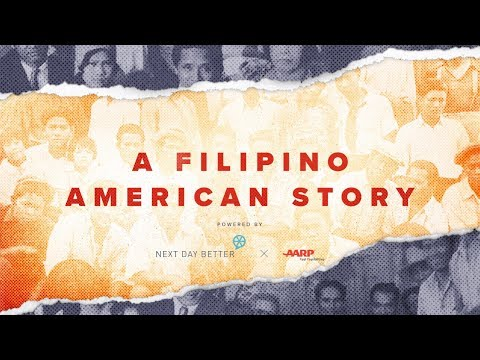
I've never heard or seen anything about FAHM since I've stumbled on the internet. Clearly I'm so Filipino I don't even know about what's going on with Fil-Ams. Or maybe I just never noticed it before because I can't relate... Well I've never been to the US even if I have relatives there so how was I supposed to know? I don't see them post about FAHM. 🤷 All I see are their pictures and the places they go to and anything about their daily life. Not that I check regularly... 😅
Anyway so since I've never heard of it (even here on Steemit!!!) and I was on the lookout for more info, I surfed some more tweets and found this infographic:
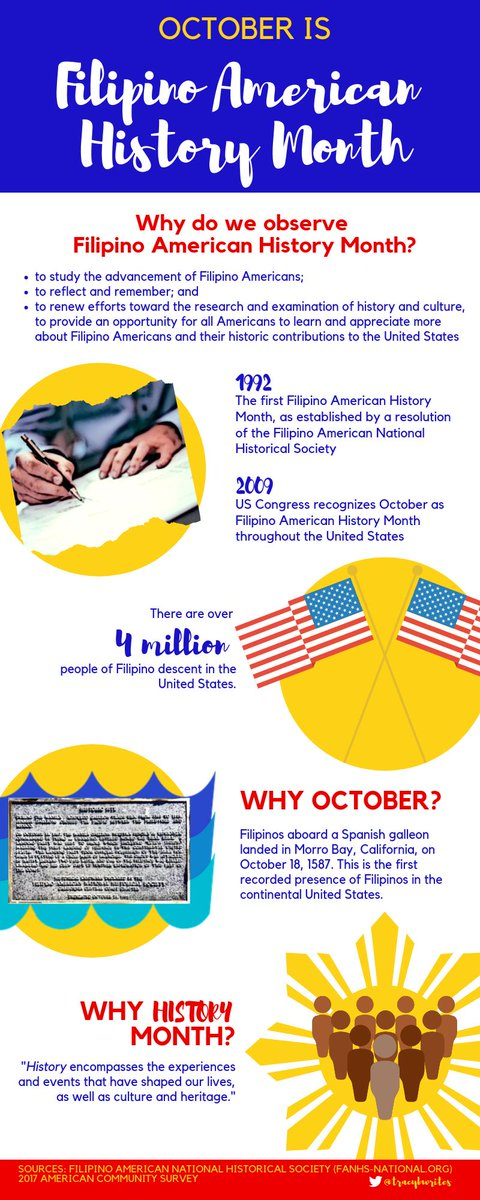
Of course I checked on Instagram posts too. There I found several Fil-Am communities having their own celebrations. Restaurants and chefs collaborating for a Filipino themed menu. Found a Fil-Am councilor as well. Cool!
Then I went and checked Facebook to see what's there. Found a great video on the topic which they also uploaded on YouTube. Watch it here:
Isn't it amazing to know about these things? I mean, sure you won't be able to relate if you're not Filipino. You might only be able to relate if you have Filipino friends and relatives... 😉 Or maybe if you had a Filipino nurse/doctor or any other profession Fil-Ams are in.
It is even a happy surprise to find out there is a Filipino American National Historical Society in America. Wow. Now I realize how big the Filipino community abroad truly is. Even if I see celebrities going abroad and doing concerts and having a smashing success I've never really truly seen how we are growing all over the world now.
Filipino American Celebrities & Influential People
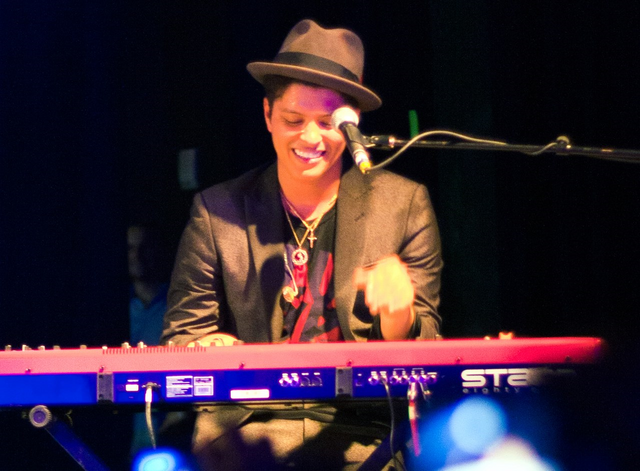 Source: Brothers Le
Source: Brothers LeWhat better way to learn about Fil-Ams than through celebrities, right? Sure I know about Bruno Mars, Whilce Portacio, Lou Diamond Phillips, and then a Pinay animator in Pixar. (I forget the name, she got featured in major newspapers and was in the news.)
Anyway, as I surfed on Twitter, I saw someone being thankful to be included in a list of 75 most influential Fil-Ams this year. I checked on the list and realized I only know 16 out of 75 Fil-Ams. Lol. One even came as a surprise she has Filipino ancestry. Anyway, looks like the people I know about are the most famous or those in the entertainment industry. 🤩
The most striking Fil-Am discovery of it all is Dr. Kevin Nadal. I never knew about him until today. He's not even in the list of 75 people but it doesn't matter. The work he does is very interesting.
What Does Being a Filipino American Mean?
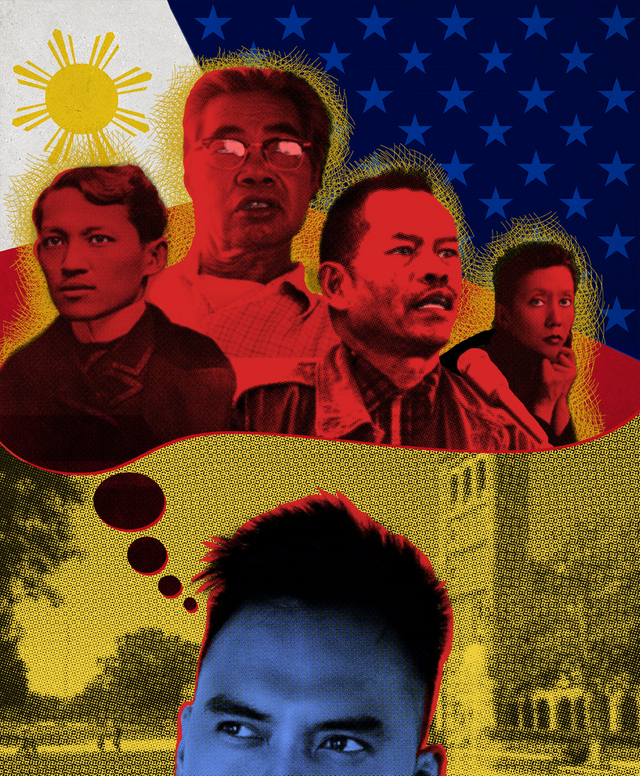 Source
SourceI've never been to any Western country before but I've known people who fly back and forth the US like it's just nearby. How? Well I have two property clients and one couple does it more often than the other (I think). 😆 Somehow another Fil-Am found me and is in the process of having their house & lot sold by us soon. (Perks of being awake in the wee hours of the morning? I dunno. 😜)
So anyway as I was checking on the #FAHM tag I found Dr. Nadal's article on what it means to be a Filipino American. Very interesting read.
I've never thought they experienced any identity crisis until I read about it. I have seen bits of it because I'm in a Facebook group of Filipino immigrants/expats worldwide. I see their posts and identity struggles. The article gave me more insight into the psyche of those who are living in America, or perhaps any Filipino immigrant.
Apparently being a Filipino or having Filipino heritage in a different country will sort of tear you in two or you'll experience nostalgia so bad. I also heard and read about how decades ago some Filipinos abroad denied they were Filipinos. Blame it on colonial mentality and discrimination. Lol. These days I believe because of FAHM, more and more FIl-Ams are becoming proud to have Filipino blood. Why? Because we are a caring and forgiving people plus cultural integration abroad is becoming a thing.
I mean just look at how famous Jokoy has become! He jokes about Filipino moms and other Filipino things and we love it. Filipinos all over the world love it. Damn we Filipinos are amazing online and offline fans. So if you want to be famous, come to the Philippines or put us in a movie and quote us in a TV series. Lol. Prove me wrong I dare you. Create and post any quality content about Filipinos or the Philippines and we'll make it trend worldwide. 🤩 (No to exploitation!!! 🤣)
Eherm... So recently, I even learned about Fil-Am parents sending their kids back to the Philippines to study. They have their reasons but all of the kids then and now experienced culture shock and discrimination. Of course. We all experience that. Even in our own country we experience discrimination between indigenous tribes and city folks and vice versa. Tsk.
The good thing though is they all said they do not regret having studied here because it made them grow up better and mature well. The grown ones have expressed how it helped them develop better work attitude too because of what they experienced. Cool eh?
As for the discrimination and bullying, well being different sometimes does not mean it will save you from it. I know because not looking like a typical Filipina with brown skin and big round eyes makes you feel like an alien in your own country. Imagine looking like a Filipino in the Philippines but speaking in a foreign accent, or worse, can't speak the language too! Whew. This is why those who were enrolled in international schools rarely experienced any deep emotional pain or mental health issues.
The Sense of Belongingness and Mental Health Issues
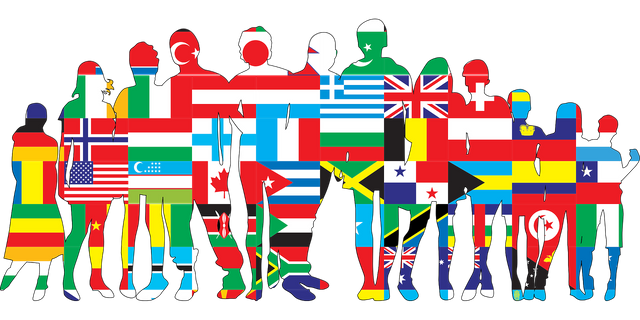
We've all read about racial discrimination: The whites against blacks, the Asians against Westerners, etc., and vice versa. It's never a good feeling when you experience it. You feel like most people are removing your right to be where and who you are. Discrimination makes you abhor your heritage too. Otherwise it can be traumatic and such a learning experience.
In Filipino Americans' case, I imagine how them having brown skin can be mistaken as being of Latin or even African descent. No wonder mixed bloods experience a sense of displacement.
I've experienced it in my own country so it's no surprise I read about it in Fil-Am stories. Growing up was a challenge especially when you feel alone in the struggle.
Did I develop any mental illness because of discrimination while growing up? I'm not really sure. Lol. I just took everything in stride and have become better at dealing with people. I have accepted that being different has its own pros and cons and not everyone will like you. It's normal and a human thing. 🤷 My mindset now has never been better. Thanks to the struggles of being in a sales career. Hehehe.
Fil-Am struggles are different though. It's a cultural and (perhaps) a first world problem. There are immigrant children who suffer and develop mental health issues different than their Philippine born parents/elders and sometimes it adds to their misery.
Growing up, I heard about how, "Depression is only for rich people. Poor people can't afford to be depressed otherwise they will starve to death." If you think about it, there's a grain of truth in there. What if we apply that to compare Filipinos in the Philippines and those who grew up abroad? Heck I don't know what to think. 😅 Afaik it happens to everyone everywhere.
On that mental health note, look at this:
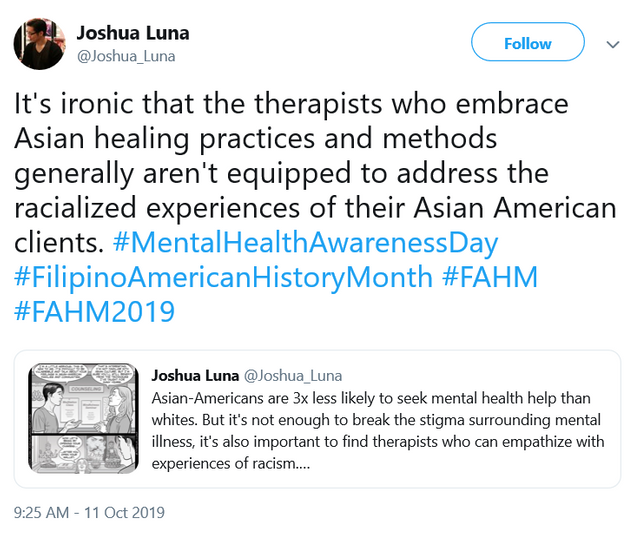
It's one of the things they have to struggle with too. A different difficulty but still a cultural hardship nonetheless.
Even with that, of course there are more things to celebrate. The Filipino customs, literature, achievements and more are growing and spreading in the US. Adobo is not the only popular Filipino food anymore. Much like the Chinese, Japanese and Indian culture, now our history and heritage are more exposed to Americans and the entire world.
Wherever we Filipinos are, it's always nice to learn about Filipino culture here and abroad. Not only should more Pinoys in the Philippines be aware of the history of Filipinos abroad, we should be proud of their achievements too. We should learn from their past and present and they should learn more about what being a Filipino in the Philippines is about too. That's where FAHM comes in.
How about you? Did you know about FAHM before? Care to share your Fil-Am life experiences abroad? Or what do you think about this article? Feel free to share below!
Originally posted on Steemit / Hive.